外研版(2019)必修第二册 Unit 6 Earth first Using language(共42页PPT,内嵌音视频)
文档属性
| 名称 | 外研版(2019)必修第二册 Unit 6 Earth first Using language(共42页PPT,内嵌音视频) | 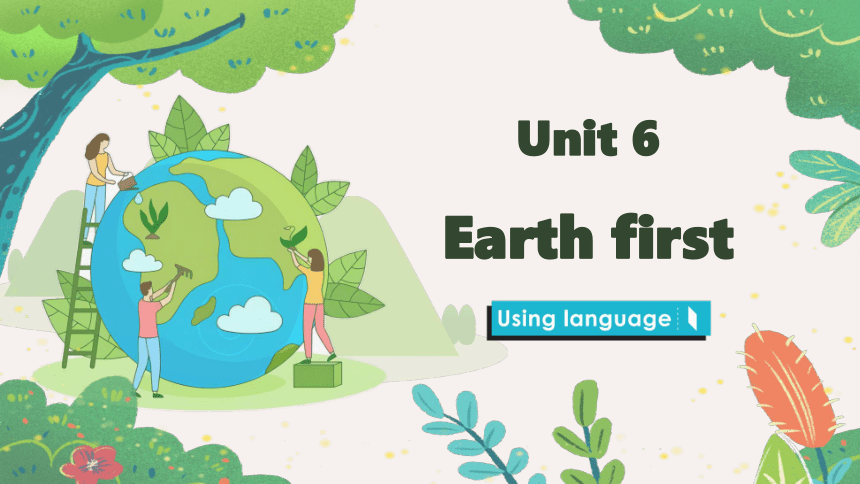 | |
| 格式 | pptx | ||
| 文件大小 | 23.8MB | ||
| 资源类型 | 教案 | ||
| 版本资源 | 外研版(2019) | ||
| 科目 | 英语 | ||
| 更新时间 | 2024-08-26 12:43:39 | ||
图片预览


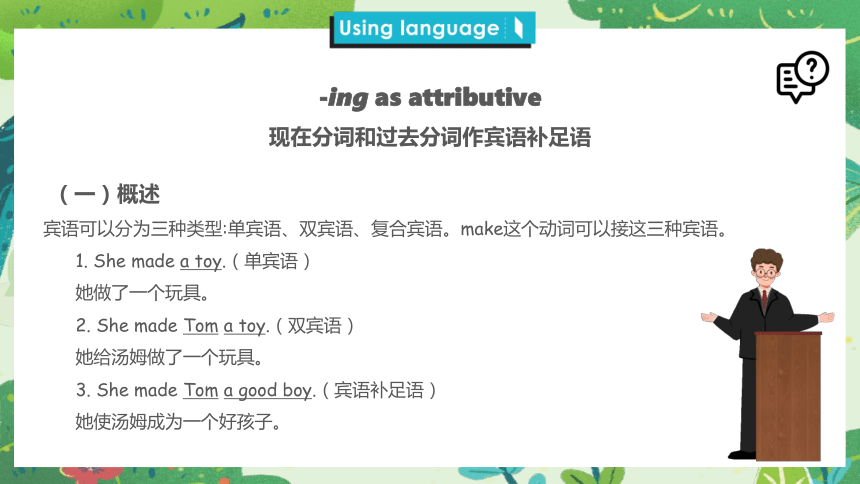
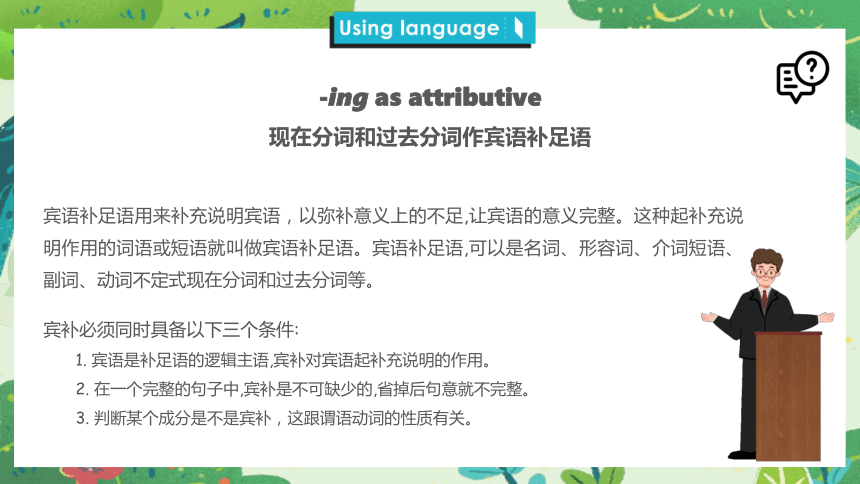

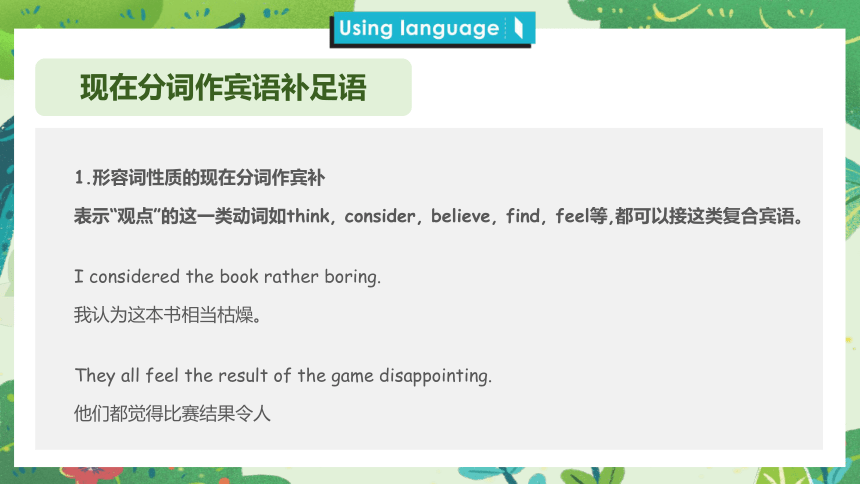
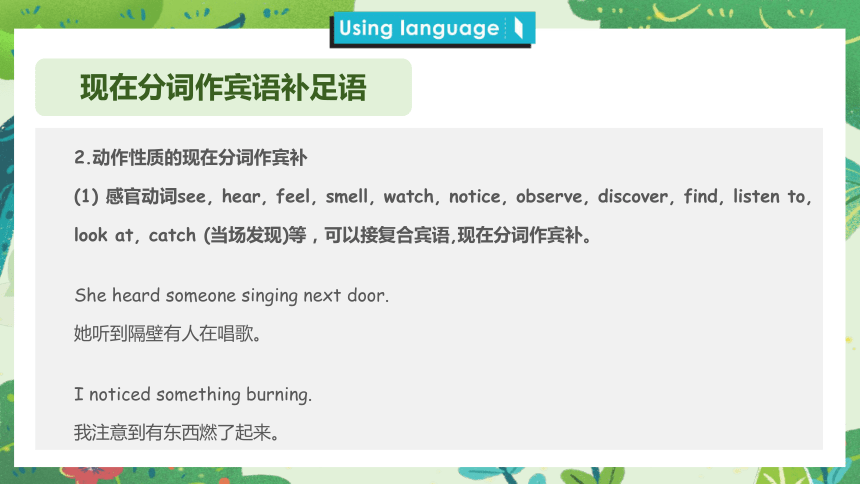
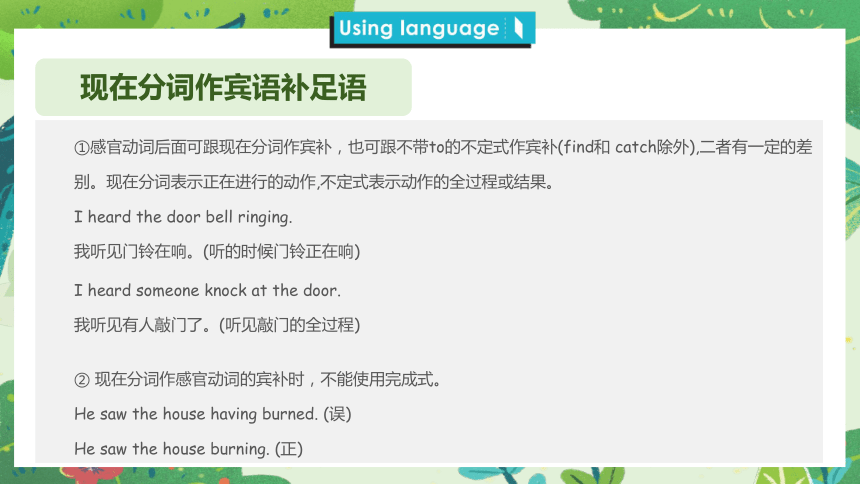




文档简介
(共42张PPT)
Unit 6
Earth first
Look at the sentences from the reading passage and
answer the questions.
In sentence (a), who is swimming at night
Over 200,000 people read the blog.
In sentence (b), who is frightened of sharks
Why does the author choose to use different
forms of verbs in the two sentences
The sun is rising.
If we use one single -ing form to modify a noun, we usually put it before the noun. If the -ing form plus other words is used to modify a noun, it is usually put after the noun.
-ing as attributive
现在分词和过去分词作宾语补足语
(一)概述
宾语可以分为三种类型:单宾语、双宾语、复合宾语。make这个动词可以接这三种宾语。
1. She made a toy.(单宾语)
她做了一个玩具。
2. She made Tom a toy.(双宾语)
她给汤姆做了一个玩具。
3. She made Tom a good boy.(宾语补足语)
她使汤姆成为一个好孩子。
-ing as attributive
现在分词和过去分词作宾语补足语
宾语补足语用来补充说明宾语,以弥补意义上的不足,让宾语的意义完整。这种起补充说明作用的词语或短语就叫做宾语补足语。宾语补足语,可以是名词、形容词、介词短语、副词、动词不定式现在分词和过去分词等。
宾补必须同时具备以下三个条件:
1. 宾语是补足语的逻辑主语,宾补对宾语起补充说明的作用。
2. 在一个完整的句子中,宾补是不可缺少的,省掉后句意就不完整。
3. 判断某个成分是不是宾补,这跟谓语动词的性质有关。
宾补是动词作用于宾语的结果。大致可分为两类:
1. 动词具有“使”“令”“导致”宾语做某事的作用,即谓语动词使宾语怎么样、成为什么或变成什么(例如:make类, tell类,cause类)。
2. 动词具有感官的性能,对宾语的动作或状态具有感知作用(see, hear, find类)。
She tried to make herself understood. (herself为宾语,过去分词understood为宾语补足语)
她设法让别人理解她的意思。
We saw the man entering the room. (the man为宾语,现在分词短语entering the room为宾语补足语)
我们看见那个人进了房间。
现在分词作宾语补足语
1.形容词性质的现在分词作宾补
表示“观点”的这一类动词如think, consider, believe, find, feel等,都可以接这类复合宾语。
I considered the book rather boring.
我认为这本书相当枯燥。
They all feel the result of the game disappointing.
他们都觉得比赛结果令人
现在分词作宾语补足语
2.动作性质的现在分词作宾补
(1) 感官动词see, hear, feel, smell, watch, notice, observe, discover, find, listen to, look at, catch (当场发现)等,可以接复合宾语,现在分词作宾补。
She heard someone singing next door.
她听到隔壁有人在唱歌。
I noticed something burning.
我注意到有东西燃了起来。
现在分词作宾语补足语
①感官动词后面可跟现在分词作宾补,也可跟不带to的不定式作宾补(find和 catch除外),二者有一定的差别。现在分词表示正在进行的动作,不定式表示动作的全过程或结果。
I heard the door bell ringing.
我听见门铃在响。(听的时候门铃正在响)
I heard someone knock at the door.
我听见有人敲门了。(听见敲门的全过程)
② 现在分词作感官动词的宾补时,不能使用完成式。
He saw the house having burned. (误)
He saw the house burning. (正)
现在分词作宾语补足语
(2) 使役动词have, get, set, leave, keep等,可以接复合宾语,现在分词作宾补。
I can't have you wasting water like that.
我不能让你那样浪费水。
3. 在“with + 宾语 + 现在分词”结构中,现在分词充当了with的宾语的补足语。
Mary felt very shy with so many eyes looking at her.
有这么多眼睛看着她,玛丽感到很害羞。
过去分词作宾语补足语
过去分词除了作状语、定语和表语外,还可以作宾语补足语。宾语与过去分词存在被动关系,即宾语是过去分词动作的承受者。
能接过去分词作宾语补足语的动词主要有两大类:一类是感官动词,另一类是使役动词。
1. 感官动词see, hear, feel, notice, find等可以接复合宾语,过去分词作宾补。
I find his English improved a lot.
我发现他的英语提高很多。
过去分词作宾语补足语
2. 使役动词make, have, get, keep, leave等可以接复合宾语,过去分词作宾补。
The foreigner tried to make herself understood, but failed.
这个外国人设法使别人明白她的意思,但失败了。
3. 意欲动词want, like, wish, expect, would like等可以接复合宾语,过去分词作宾补。
The mother wants her daughter taught music in her free time.
这位母亲想让她的女儿在空闲时间学音乐。
非谓语形式作宾补的区别
1.现在分词作宾补和过去分词作宾补的区别
现在分词作宾补,宾语是动作的执行者;过去分词作宾补,宾语是动作的承受者。
I saw the dog following a man.
我看见那只狗跟在一个人的身后。
I saw the dog followed by a man.
我看见有人在那只狗后面跟着。
非谓语形式作宾补的区别
2.不定式现在分词、过去分词作宾补的区别
不定式表示动作的全过程或结果;现在分词表示主动和正在进行;过去分词表示被动和完成。
Some students last saw Reed playing near an Internet bar.
几个学生最后看见瑞德时他正在一家网吧附近玩耍。
I'd like to see a proposal put forward at once.
我想看到立马有人提出建议。
非谓语形式作宾补的区别
3.过去分词现在分词被动式作宾补的区别
She heard her name called just a moment ago.
刚才她听见有人叫过她的名字。 (called是过去分词作宾补,表示“被动和完成”)
She heard her name being called from behind and stopped to look back.
她听见有人在后面一直叫她的名字,就停下来向后看。
(being called是现在分词的被动式作宾补,表示“被动和进行”)
Vocabulary
1. devote
devoted adj.忠诚的;深爱的;全心全意的
devotion n.深爱,热爱,奉献
devote one's life/energy/time/money/attention to (doing) sth.
把某人的生命/精力/时间/金钱/注意力用于(做)某事
devote oneself to (doing) sth.= sb.+ be devoted to (doing) sth.
致力于(做)某事,献身于(做)某事
练习:She _______________ (devote) to the cause of peace all her life.
was devoted
Vocabulary
2. presentation
present v.呈现;授予 n.礼物;目前
make/give a short presentation 作一个简短介绍
the presentation of evidence 证据的提交
the presentation of prizes 奖品的颁发
练习:I was asked to give a short _________ (present) on the aims of the plan.
presentation
Vocabulary
3. establish
establish relations/links/contact (with sb.) (与某人)建立联系
establish an agency 成立一个代理处
establish funds 设立基金
establish whether/if... 确定是否……
establish how... 确定如何……
练习:Our goal is _________ (establish) a new research centre in the north.
to establish
Vocabulary
4. damage
do/cause damage to 对……造成损害
damage from 由……起的损失
damage one's property/reputation 损害某人的财产名誉
damage to one's reputation 对某人名誉的损害
pay for the damage 赔偿损失
brain/liver damage 脑损伤/肝损伤
damage one's health 损害某人的健康
can be easily damaged 容易损坏
练习:The earthquake caused serious damage _______ the house.
to
Vocabulary
5. flood
flood water 洪水
cause floods 引发水灾
flood damage 洪涝灾害
flood warnings 水灾警告
a flood of 大量的……
a flood of complaints 大量投诉
be in flood (河水)上涨,泛滥
in foods of tears 泪如雨下
练习:Adults understand what it feels like ________________ (flood) with objects.
to be flooded
Vocabulary
6. reduce
reduction n.减少;缩小
be reduced to... 沦落为……;被迫……(to为介词)
reduce sb.to tears/silence 使某人流泪/沉默
reduce from +起点 从……降低/减少
reduce to +终点 减少到……
reduce by+程度 减少了……
练习:It was foggy so the driver had to reduce speed ______ forty kilometres an hour.
to
Vocabulary
7. severe
severely adv.很严重地;极为恶地
lace severe economic problems 面临严重的经济问题
severe weather conditions 恶劣的天气情况
cause severe damage 造成严重的破坏
severe injuries 严重的伤势
a severe winter 严冬
练习:Anyone breaking the law will be __________ (severe) punished.
severely
Vocabulary
8. infection
infect v.传染;使感染
suffer from an infection 患上感染/传染病
virus infection 病毒感染
have an infection 受感染
get/develop an infection 受感染
treat an infection 治疗感染
fight an infection 抵御传染
the source of an infection 传染源
练习:Ear __________ (infect) are common in preschool children.
infections
Vocabulary
9. infection
lecture sb. about/on sth. 因某事指责/训斥某人
lecture sb. about doing sth. 因做某事指责/训斥某人
a lecture on/about sth. 关于……的讲课/训斥
give a lecture (to sb.) (给某人)讲课/演讲
lecture on sth 讲授某方面的课程
attend a lecture 出席讲座
in the lecture hall 在演讲厅
练习:She lectures ______ Russian literature.
on
Read the passage and choose the correct form of the verbs.
Hannah Fraser
Attracted / Attracting by mermaids since she was a child, Hannah Fraser created her first tail when she was only nine years old. Now, she is a model and performance artist devoted / devoting to ocean conservation. She can be seen worn / wearing mermaid clothing and dived / diving up to 50 feet underwater to swim with dolphins, sharks and whales. She appeared in The Cove, a documentary aiming at highlighting the cruelty of dolphin hunting. Besides performing and modelling, Hannah travels the world given / giving presentations and talks, getting more people involved / involving in the conservation of ocean life.
Read the passage and choose the correct form of the verbs.
Rewrite the underlined sentences in the interview, using the -ing and -ed forms to make it more compact and coherent.
Here, you can see dramatic landscapes changing from mountains to grasslands, forests to rivers.
Rewrite the underlined sentences in the interview, using the -ing and -ed forms to make it more compact and coherent.
In recent years, we have seen large areas of wetland damaged by human activity.
Rewrite the underlined sentences in the interview, using the -ing and -ed forms to make it more compact and coherent.
This includes keeping the original environment untouched, ...
Share what you know about these expressions.
The sum total of all the greenhouse gas emissions that had to take place in order for a product to be produced or for an activity to take place.
A warming of Earth’s surface and troposphere (the lowest layer of the atmosphere) caused by the presence of water vapour, carbon dioxide, methane, and certain other gases in the air.
reusable water bottle
carbon footprint
renewable energy
LED bulb
Water conservation
greenhouse effect
Work in pairs.
Discuss what you can do to help deal with global warming,
using the words and expressions you have learnt.
A: I will go to school by bike to reduce my carbon footprint.
B: I will bring a reusable bag when I go shopping.
...
Listen to the lecture and choose the topics that are covered.
1. What the word “smog” means.
2. When the word “smog” appeared.
3. What caused smog in the past.
4. What causes smog now.
5. The effects of smog on the environment.
6. How governments try to reduce smog.
7. What will happen if we don’t reduce smog.
Listen to the lecture and choose the topics that are covered.
1900s
The Great Smog
no wind
chemicals
coming from traffic
requirements
of paying
to drive
chemicals
Activity 9
Work in pairs and talk about recycling.
student A
Tell Student B about recycling using the information below. Be prepared to be corrected by Student B.
The classification of household waste aims to help people separate different types of waste. This is important because these different types of waste can be disposed of or recycled appropriately and effectively.
Household waste can be roughly divided into:
* food waste
* non-recyclable waste
* recyclable waste, including paper, glass, plastic and used batteries
Activity 9
Work in pairs and talk about recycling.
student A
Tell Student B about recycling using the information below. Be prepared to be corrected by Student B.
China plans to introduce household waste classification and
sorting in the first batch of cities by 2020. Only Beijing,
Shanghai, Tianjin and Chongqing are included in the first
batch.
The target recycling rate in these cities has been set at 55%
by 2020.
student B
Listen to Student A talking about recycling. Interrupt politelyto correct him / her using the following information:
Activity 9
Used batteries are usually regarded as non-recyclable waste and should be disposed of separately.
The first batch of cities to introduce household waste classification and sorting includes Beijing, Shanghai, Tianjin, Chongqing and all capitals of provinces and autonomous regions.
The target recycling rate in these cities has been set at 35% by 2020.
Exercise
1.I also shop for __________ (variety) things online.
2.It takes me less than 15 minutes ________(wash), get changed, have breakfast and leave home.
3.He knows he should spend more time __________ (enjoy) real life.
4.My car ____________(damage) to such an extent in the accident yesterday that it could not be repaired.
5.The use of robots reduced the company's expenses ________ 11% last year.
various
to wash
enjoying
was damaged
by
Exercise
6. Don't have the light ________ (burn) all day, which is a bad habit you must quit.
7. Before boarding the flight, you are required to get your luggage ________ (check).
8. No one will be allowed to go into the lab without the teacher's ___________ (permit).
9. He got up late and hurried to his office, leaving the breakfast___________ (touch).
10. With all the problems________ (solve), they went home happily.
burning
checked
permission
solved
untouched
Review the language points and complete the exercises.
Work in pairs. Talk about another environmental problem and have a similar conversation.
Homework
See you next class!
Unit 6
Earth first
Look at the sentences from the reading passage and
answer the questions.
In sentence (a), who is swimming at night
Over 200,000 people read the blog.
In sentence (b), who is frightened of sharks
Why does the author choose to use different
forms of verbs in the two sentences
The sun is rising.
If we use one single -ing form to modify a noun, we usually put it before the noun. If the -ing form plus other words is used to modify a noun, it is usually put after the noun.
-ing as attributive
现在分词和过去分词作宾语补足语
(一)概述
宾语可以分为三种类型:单宾语、双宾语、复合宾语。make这个动词可以接这三种宾语。
1. She made a toy.(单宾语)
她做了一个玩具。
2. She made Tom a toy.(双宾语)
她给汤姆做了一个玩具。
3. She made Tom a good boy.(宾语补足语)
她使汤姆成为一个好孩子。
-ing as attributive
现在分词和过去分词作宾语补足语
宾语补足语用来补充说明宾语,以弥补意义上的不足,让宾语的意义完整。这种起补充说明作用的词语或短语就叫做宾语补足语。宾语补足语,可以是名词、形容词、介词短语、副词、动词不定式现在分词和过去分词等。
宾补必须同时具备以下三个条件:
1. 宾语是补足语的逻辑主语,宾补对宾语起补充说明的作用。
2. 在一个完整的句子中,宾补是不可缺少的,省掉后句意就不完整。
3. 判断某个成分是不是宾补,这跟谓语动词的性质有关。
宾补是动词作用于宾语的结果。大致可分为两类:
1. 动词具有“使”“令”“导致”宾语做某事的作用,即谓语动词使宾语怎么样、成为什么或变成什么(例如:make类, tell类,cause类)。
2. 动词具有感官的性能,对宾语的动作或状态具有感知作用(see, hear, find类)。
She tried to make herself understood. (herself为宾语,过去分词understood为宾语补足语)
她设法让别人理解她的意思。
We saw the man entering the room. (the man为宾语,现在分词短语entering the room为宾语补足语)
我们看见那个人进了房间。
现在分词作宾语补足语
1.形容词性质的现在分词作宾补
表示“观点”的这一类动词如think, consider, believe, find, feel等,都可以接这类复合宾语。
I considered the book rather boring.
我认为这本书相当枯燥。
They all feel the result of the game disappointing.
他们都觉得比赛结果令人
现在分词作宾语补足语
2.动作性质的现在分词作宾补
(1) 感官动词see, hear, feel, smell, watch, notice, observe, discover, find, listen to, look at, catch (当场发现)等,可以接复合宾语,现在分词作宾补。
She heard someone singing next door.
她听到隔壁有人在唱歌。
I noticed something burning.
我注意到有东西燃了起来。
现在分词作宾语补足语
①感官动词后面可跟现在分词作宾补,也可跟不带to的不定式作宾补(find和 catch除外),二者有一定的差别。现在分词表示正在进行的动作,不定式表示动作的全过程或结果。
I heard the door bell ringing.
我听见门铃在响。(听的时候门铃正在响)
I heard someone knock at the door.
我听见有人敲门了。(听见敲门的全过程)
② 现在分词作感官动词的宾补时,不能使用完成式。
He saw the house having burned. (误)
He saw the house burning. (正)
现在分词作宾语补足语
(2) 使役动词have, get, set, leave, keep等,可以接复合宾语,现在分词作宾补。
I can't have you wasting water like that.
我不能让你那样浪费水。
3. 在“with + 宾语 + 现在分词”结构中,现在分词充当了with的宾语的补足语。
Mary felt very shy with so many eyes looking at her.
有这么多眼睛看着她,玛丽感到很害羞。
过去分词作宾语补足语
过去分词除了作状语、定语和表语外,还可以作宾语补足语。宾语与过去分词存在被动关系,即宾语是过去分词动作的承受者。
能接过去分词作宾语补足语的动词主要有两大类:一类是感官动词,另一类是使役动词。
1. 感官动词see, hear, feel, notice, find等可以接复合宾语,过去分词作宾补。
I find his English improved a lot.
我发现他的英语提高很多。
过去分词作宾语补足语
2. 使役动词make, have, get, keep, leave等可以接复合宾语,过去分词作宾补。
The foreigner tried to make herself understood, but failed.
这个外国人设法使别人明白她的意思,但失败了。
3. 意欲动词want, like, wish, expect, would like等可以接复合宾语,过去分词作宾补。
The mother wants her daughter taught music in her free time.
这位母亲想让她的女儿在空闲时间学音乐。
非谓语形式作宾补的区别
1.现在分词作宾补和过去分词作宾补的区别
现在分词作宾补,宾语是动作的执行者;过去分词作宾补,宾语是动作的承受者。
I saw the dog following a man.
我看见那只狗跟在一个人的身后。
I saw the dog followed by a man.
我看见有人在那只狗后面跟着。
非谓语形式作宾补的区别
2.不定式现在分词、过去分词作宾补的区别
不定式表示动作的全过程或结果;现在分词表示主动和正在进行;过去分词表示被动和完成。
Some students last saw Reed playing near an Internet bar.
几个学生最后看见瑞德时他正在一家网吧附近玩耍。
I'd like to see a proposal put forward at once.
我想看到立马有人提出建议。
非谓语形式作宾补的区别
3.过去分词现在分词被动式作宾补的区别
She heard her name called just a moment ago.
刚才她听见有人叫过她的名字。 (called是过去分词作宾补,表示“被动和完成”)
She heard her name being called from behind and stopped to look back.
她听见有人在后面一直叫她的名字,就停下来向后看。
(being called是现在分词的被动式作宾补,表示“被动和进行”)
Vocabulary
1. devote
devoted adj.忠诚的;深爱的;全心全意的
devotion n.深爱,热爱,奉献
devote one's life/energy/time/money/attention to (doing) sth.
把某人的生命/精力/时间/金钱/注意力用于(做)某事
devote oneself to (doing) sth.= sb.+ be devoted to (doing) sth.
致力于(做)某事,献身于(做)某事
练习:She _______________ (devote) to the cause of peace all her life.
was devoted
Vocabulary
2. presentation
present v.呈现;授予 n.礼物;目前
make/give a short presentation 作一个简短介绍
the presentation of evidence 证据的提交
the presentation of prizes 奖品的颁发
练习:I was asked to give a short _________ (present) on the aims of the plan.
presentation
Vocabulary
3. establish
establish relations/links/contact (with sb.) (与某人)建立联系
establish an agency 成立一个代理处
establish funds 设立基金
establish whether/if... 确定是否……
establish how... 确定如何……
练习:Our goal is _________ (establish) a new research centre in the north.
to establish
Vocabulary
4. damage
do/cause damage to 对……造成损害
damage from 由……起的损失
damage one's property/reputation 损害某人的财产名誉
damage to one's reputation 对某人名誉的损害
pay for the damage 赔偿损失
brain/liver damage 脑损伤/肝损伤
damage one's health 损害某人的健康
can be easily damaged 容易损坏
练习:The earthquake caused serious damage _______ the house.
to
Vocabulary
5. flood
flood water 洪水
cause floods 引发水灾
flood damage 洪涝灾害
flood warnings 水灾警告
a flood of 大量的……
a flood of complaints 大量投诉
be in flood (河水)上涨,泛滥
in foods of tears 泪如雨下
练习:Adults understand what it feels like ________________ (flood) with objects.
to be flooded
Vocabulary
6. reduce
reduction n.减少;缩小
be reduced to... 沦落为……;被迫……(to为介词)
reduce sb.to tears/silence 使某人流泪/沉默
reduce from +起点 从……降低/减少
reduce to +终点 减少到……
reduce by+程度 减少了……
练习:It was foggy so the driver had to reduce speed ______ forty kilometres an hour.
to
Vocabulary
7. severe
severely adv.很严重地;极为恶地
lace severe economic problems 面临严重的经济问题
severe weather conditions 恶劣的天气情况
cause severe damage 造成严重的破坏
severe injuries 严重的伤势
a severe winter 严冬
练习:Anyone breaking the law will be __________ (severe) punished.
severely
Vocabulary
8. infection
infect v.传染;使感染
suffer from an infection 患上感染/传染病
virus infection 病毒感染
have an infection 受感染
get/develop an infection 受感染
treat an infection 治疗感染
fight an infection 抵御传染
the source of an infection 传染源
练习:Ear __________ (infect) are common in preschool children.
infections
Vocabulary
9. infection
lecture sb. about/on sth. 因某事指责/训斥某人
lecture sb. about doing sth. 因做某事指责/训斥某人
a lecture on/about sth. 关于……的讲课/训斥
give a lecture (to sb.) (给某人)讲课/演讲
lecture on sth 讲授某方面的课程
attend a lecture 出席讲座
in the lecture hall 在演讲厅
练习:She lectures ______ Russian literature.
on
Read the passage and choose the correct form of the verbs.
Hannah Fraser
Attracted / Attracting by mermaids since she was a child, Hannah Fraser created her first tail when she was only nine years old. Now, she is a model and performance artist devoted / devoting to ocean conservation. She can be seen worn / wearing mermaid clothing and dived / diving up to 50 feet underwater to swim with dolphins, sharks and whales. She appeared in The Cove, a documentary aiming at highlighting the cruelty of dolphin hunting. Besides performing and modelling, Hannah travels the world given / giving presentations and talks, getting more people involved / involving in the conservation of ocean life.
Read the passage and choose the correct form of the verbs.
Rewrite the underlined sentences in the interview, using the -ing and -ed forms to make it more compact and coherent.
Here, you can see dramatic landscapes changing from mountains to grasslands, forests to rivers.
Rewrite the underlined sentences in the interview, using the -ing and -ed forms to make it more compact and coherent.
In recent years, we have seen large areas of wetland damaged by human activity.
Rewrite the underlined sentences in the interview, using the -ing and -ed forms to make it more compact and coherent.
This includes keeping the original environment untouched, ...
Share what you know about these expressions.
The sum total of all the greenhouse gas emissions that had to take place in order for a product to be produced or for an activity to take place.
A warming of Earth’s surface and troposphere (the lowest layer of the atmosphere) caused by the presence of water vapour, carbon dioxide, methane, and certain other gases in the air.
reusable water bottle
carbon footprint
renewable energy
LED bulb
Water conservation
greenhouse effect
Work in pairs.
Discuss what you can do to help deal with global warming,
using the words and expressions you have learnt.
A: I will go to school by bike to reduce my carbon footprint.
B: I will bring a reusable bag when I go shopping.
...
Listen to the lecture and choose the topics that are covered.
1. What the word “smog” means.
2. When the word “smog” appeared.
3. What caused smog in the past.
4. What causes smog now.
5. The effects of smog on the environment.
6. How governments try to reduce smog.
7. What will happen if we don’t reduce smog.
Listen to the lecture and choose the topics that are covered.
1900s
The Great Smog
no wind
chemicals
coming from traffic
requirements
of paying
to drive
chemicals
Activity 9
Work in pairs and talk about recycling.
student A
Tell Student B about recycling using the information below. Be prepared to be corrected by Student B.
The classification of household waste aims to help people separate different types of waste. This is important because these different types of waste can be disposed of or recycled appropriately and effectively.
Household waste can be roughly divided into:
* food waste
* non-recyclable waste
* recyclable waste, including paper, glass, plastic and used batteries
Activity 9
Work in pairs and talk about recycling.
student A
Tell Student B about recycling using the information below. Be prepared to be corrected by Student B.
China plans to introduce household waste classification and
sorting in the first batch of cities by 2020. Only Beijing,
Shanghai, Tianjin and Chongqing are included in the first
batch.
The target recycling rate in these cities has been set at 55%
by 2020.
student B
Listen to Student A talking about recycling. Interrupt politelyto correct him / her using the following information:
Activity 9
Used batteries are usually regarded as non-recyclable waste and should be disposed of separately.
The first batch of cities to introduce household waste classification and sorting includes Beijing, Shanghai, Tianjin, Chongqing and all capitals of provinces and autonomous regions.
The target recycling rate in these cities has been set at 35% by 2020.
Exercise
1.I also shop for __________ (variety) things online.
2.It takes me less than 15 minutes ________(wash), get changed, have breakfast and leave home.
3.He knows he should spend more time __________ (enjoy) real life.
4.My car ____________(damage) to such an extent in the accident yesterday that it could not be repaired.
5.The use of robots reduced the company's expenses ________ 11% last year.
various
to wash
enjoying
was damaged
by
Exercise
6. Don't have the light ________ (burn) all day, which is a bad habit you must quit.
7. Before boarding the flight, you are required to get your luggage ________ (check).
8. No one will be allowed to go into the lab without the teacher's ___________ (permit).
9. He got up late and hurried to his office, leaving the breakfast___________ (touch).
10. With all the problems________ (solve), they went home happily.
burning
checked
permission
solved
untouched
Review the language points and complete the exercises.
Work in pairs. Talk about another environmental problem and have a similar conversation.
Homework
See you next class!
